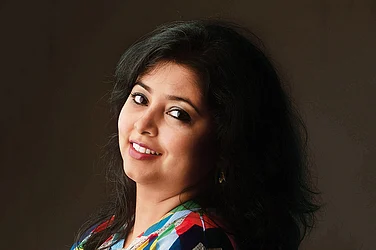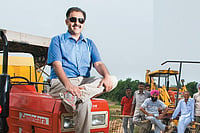I have two children — one boy, one girl — and a very small piece of land,” says 40-year-old Kamal of Varanasi. His face is wrinkled and tanned, and he looks emaciated, but his calves are muscular, which leaves no doubt about what he has been doing all his life. “I have pulled a rickshaw for 20 years but I could never own one for most part,” shares Kamal. A study estimated that there are 100 million rickshawallahs in India and 95% of them rent their vehicles from mafia-like fleet merchants. The Kamals of Varanasi slog 14-hours a day in rain or shine, own nothing, save nothing, and pay₹40-50 of the ₹200 they earn ferrying desis and firangs through the narrow streets of Varanasi.
But something changed for Kamal a year ago. Tipped off by a fellow rickshawallah, he rode to SMV Wheels, a social enterprise set up just for rickshaw pullers, and bought a new rickshaw from them for a down payment of #750. He also got a driving license, a permit as well as vehicle and medical insurance. SMV sells its modernised rickshaws at ₹14,750; Varanasi’s traditional wooden rickshaws cost ₹500 more. Kamal pays ₹250 per week as installment and the rickshaw will be his in a few months. “Now I can spend money on my kids,” Kamal says.
It’s 30-year-old Naveen Krishna who has given hope to Kamal and his peers. “He can own a rickshaw in 14 months through equal weekly installments,” he says. SMV stands for smart moving vehicles. Varanasi’s traditional rickshaws weigh between 95-105 kilos — SMV’s rickshaw uses hollow iron pipes, weighs 75-80 kilos, employs double-ball bearings and comes with a canopy. SMV gets design support from IIT-BHU (Varanasi Hindu University).
Krishna, masters in social work, worked for the Ministry of Rural Development’s Council for Advancement of People’s Action and Rural Technology project, before coming back to Varanasi. His father was shocked. “He felt I was doing something stupid,” he recalls. Even banks nixed his idea. His personal funds were exhausted. “I had ₹7,000 when I approached my mentor Sumit Swaroop,” Krishna says. Swaroop, founder, Magic Tree House Play Schools in Delhi gave Krishna ₹40,000, who floated SMV Wheels in April 2010.
Five foreign funds have invested in SMV since — First Light Ventures, K L Felicitas Foundation, Silicon Valley Community Fund, A-spark Goodwill venture and UnLtd INdia. A total investment of ₹1.25 crore was committed, to be released in three tranches. “We have spent ₹50 lakh and have sold 443 units in FY12,” Krishna says. “We aim to sell 1,000 this year.” He is confident SMV will break even in three years. It recorded a revenue of ₹30 lakh in FY12.
Pedalling up
Krishna was always fascinated by rickshawallahs. “As a society, we must empower them.” But convincing them was a challenge. “Our strength comes from involving the municipality,” says Krishna. The municipality decides the number of rickshaw permits to be issued. Legally, only one person permit can be awarded to one rickshaw. But this remains only on paper.
On ground, a few grab multiple licences by putting up fake names and bribing officials. Then they rent out rickshaws to pullers. In Varanasi, 40,000 rickshaws ply although only 10,000 permits have been issued. Krishna feels that the administrative officials want to cleanse the system and are willing to support SMV.
The company makes its money by placing orders in bulk. Each rickshaw costs ₹12,000 that includes ₹600 for insurance premium and municipal fee. The unit is sold at ₹14,750 and the puller has to pay ₹500 as down payment and ₹250 as an advanced installment. SMV makes ₹2,750 per unit sold. So far, 550 rickshaws bearing the SMV tag are on the streets, 50 of which are already owned by the pullers. Krishna wants to buy more rickshaws to fuel his expansion plans and has reached neighbouring Jaunpur. “Even if 1-2% of rickshaw pullers are targeted, it’s a huge market for us,” says Krishna. Other cities will soon be targeted through the franchise model.
Risky ride
One of SMV’s investors, Tej Dhami, director, UnLtd, says, “We look for a proven model, social impact, and sustainability. SMV offered a combination of all three.”
But not everything is rosy. Krishna admits that funds are hard to raise — banks make no distinction between a social enterprise and any other business. “They ask for 100% collateral, which is ridiculous,” he says. SMV’s CFO agrees. “We certainly need more commercial funding to grow,” says 29-year-old Harvard-educated Texan Joy Jauer (in picture).
Then there is the question of risk. SMV reduces its risk when it sells rickshaws on credit only to residents of Varanasi. “Someone who has been navigating our streets for five years is perfect,” says Krishna. Migrants are a no-no, although exceptions are made for ‘genuine’ outsiders with local guarantors.
Women of the family are encouraged to inform the company if there’s any risk of default. “Women tell us things like, ‘he has been splurging all his money on liquor and can’t pay you’,” reveals Krishna. “We give a two week warning and then seize the rickshaw, re-selling it to another customer at a discount.” There have been 20 such cases so far. To improve income, ads of local brands are carried on the back of these rickshaws, the pullers earn ₹300 per month through that.
Krishna wraps up by saying that he met UP’s new CM, Akhilesh Yadav, a month ago, and that Yadav liked his model. Who wouldn’t?






























